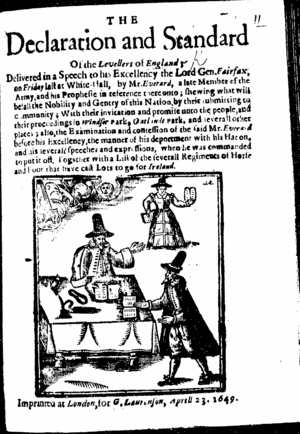anarchyinaction>D A Earwig m (wikilink) |
m (1 revision imported) |
(No difference)
| |
Latest revision as of 15:09, 24 July 2024

The Diggers were a millenarian Protestant group that, during the English Revolution, advocated communist land ownership and the abolition of masters. On 1 April 1649, a group of about forty Diggers established a participatory community on St. George's Hill in Surrey, which they renamed George's Hill (since as Protestants they rejected the concept of sainthood). The group dug the barren land and planted beans, wheat, rye, parsnips, and carrots.[1] Their "Diggers' Song" of April 1st envisioned a radical levelling of wealth and power:
Your houses they pull down to fright poor men in town,
But the gentry must come down, and the poor shall wear the crown.
Stand up now, Diggers all.
With spades and hoes and plows, stand up now, stand up now [2]
Local authorities responded by trampling the Diggers' seedlings, destroying their huts, and stealing their tools. Nonetheless, the Diggers maintained their community on the hill for about a year.[3]
Gerrad Winstanley wrote the Diggers' manifesto The True Leveller's Standard Advanced, which declared "the Earth to be a Common Treasury" of humanity and rejected the notion "that one branch of mankind should rule over another."[4]
Murray Bookchin claims that Winstanley's naturalistic philosophy approached pantheism and Enlightenment-era anarcho-communism:
But his view became markedly pantheistic, even hostile to any notion of an anthropomorphic deity. His naturalism brings him very close to Enlightenment social theory: "To know the secrets of nature is to know the works of God." His denial of a supernatural heaven and hell as a "strange conceit" would have brought him to the stake a few centuries earlier. He emphasizes the need not only for "communal property" but perhaps even for usufruct. "The earth with all her fruits of Corn, Cattle, and such like was made to be a common Store-House of Livelihood," he declares, "to all mankind friend and foe, without exception." These words are not merely brave but also deeply felt. Reason is the "great creator" that "made the earth a common treasury" and anarchy (in the literal sense of "no-rule) was its earliest disposition--for "not one word was spoken in the beginning that one branch of mankind should rule over another."
- ↑ Peter Marshall, Demanding the Impossible (London: HarperPerennial, 2008), 96-97.
- ↑ Peter Linebaugh, "A Diggers Song," Counterpunch, 1 April 2015, http://www.counterpunch.org/2015/04/01/a-diggers-song/.
- ↑ Marshall, Demanding the Impossible, 98.
- ↑ Gerrad Winstanley, "The True Leveller's Standard Advanced," Internet Marxist Archive, https://www.marxists.org/reference/archive/winstanley/1649/levellers-standard.htm.